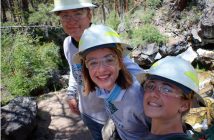This is the time of year when people escape the comfort of their surroundings and seek a transient experience beyond the horizon. My wife and I recently visited the Big Island of Hawaii as we heard it was the most tranquil of this Pacific island chain and best maintained the “aloha spirit” which is the charm, warmth and sincerity that Hawaii’s people are known for.
There were no tourist attractions we needed to check off a list besides a flight over the active Kilauea Volcano, better known to the Hawaiians as Pele- the Goddess of Fire. No luaus or hula dancers for us. Instead, it was all about getting away, enjoying nature and each other’s company.
I am a planner. It is what I do for a living but the only thing I planned for this tropical retreat was to be disengaged from the work I love. This was to be a vacation by design rather than by default. It would be a time to slow down. I knew it would take a couple of days to ease into the pace of island life but I was full of pride as I set my e-mail on auto response. I would not be online all week!
I was determinedly disconnected but this was not the case with many of the visitors to this serene island. Each morning we awoke to the rising sun and the sounds of the sea. While relishing the ocean views from our lanai we noticed a young father pushing a baby cart on the pathway below with one hand while responding to emails on his smart phone with the other. It brought sadness to me as I recognized he was not experiencing the important things right in front of him. Did he even see the Honu (Hawaiian Green Turtles) sleeping on the sand? What about the vibrant Apapane flying from palm tree to palm tree? He was not connecting to nature and most importantly he was not connecting to his child.
After the sun had risen, the aroma of the 100 percent Kona coffee led us to the resort’s open air coffee shop. I immediately understood why there is such a premium for this delectable morning delight. We sat on the couch overlooking a tranquil pond of Koi. Most of the patrons in the café had a laptop or tablet in hand. E-mails were being answered; some were reading the Wall Street Journal or their home newspaper online. Others were posting photos on Facebook. Although their intent may have been to leave their fast pace lifestyle at home, they were continuing to be “connected” which actually disconnected them from their present surroundings.
It’s not easy for most of us to disconnect but I began to feel liberated and in flow with life like the molten lava we viewed flowing into the sea just days earlier. I was quickly reminded when visiting Hapuna Beach, a location frequently voted as one of the world’s best beaches, how some visitors “missed the point” during their time in the sun and sea by viewing news videos on their iPads, and talking loudly on their cell phones.
I have always found it intriguing and wondered why hundreds of Hawaiians have moved to Central Oregon over the years. Could it be our volcanic landscape that reminds them of the islands? Could it be the attitude of friendly acceptance for which Central Oregon and the Hawaiian Islands are both known for? Bill Keale is one of Central Oregon’s most celebrated and beloved musicians known for his beautiful voice and Slack Key Guitar skills. He is a native Hawaiian who comes from a long lineage of legendary musicians such as his Uncle Moe Keale and cherished cousin Israel Kamakawiwo’ole – better recognized as Bruddah IZ. IZ’s voice became famous outside Hawaii with his medley of Over the Rainbow and What a Wonderful World. Bill sings a version of IZ’s heartwarming yet sad song titled Hawaii 1978 which profoundly shares how he believes King Kamehameha and his wife would feel if they were still alive today and saw the islands in their present state. Contemporary Hawaii is a far cry from its past. Development remains a huge issue and land prices are out of reach for much of the native population. The Islands‘ limited natural resources are being seriously tapped. The reflective lyrics consist of: “How would they feel about the changes of our land? Could you just imagine if they were around and saw highways on their sacred grounds – how would they feel about modern city life? Tears would come from each other’s eyes as they would stop to realize that our people are in great danger now.” Is our society in danger of being too connected?
Gerry Lopez is another prominent individual to call Bend, Oregon home. He is a legendary surfing icon who led the short board revolution surfing craze of the early 1970s. He won the Pipeline Masters of Oahu’s North Shore competition in 1972 and 1973, which has since been named the Gerry Lopez Pipeline Masters. I was recently given his biography of entertaining stories to read on my Hawaiian vacation. His messages of surfing resonated with me and my growing concerns for our society: “Surfing happens best when it’s the present; the past is behind and the future not yet. The only thing of interest is what’s here and now.” This is a timeless message from an icon for the soul of surfing.
One day we visited the Waipio Valley in a rented Jeep. The incredibly steep and sinuous road drops 2,000 feet to the valley floor in .6 miles making it the steepest road in the United States. It is an idyllic tropical setting of waterfalls plunging into the valley and an expansive black sand beach. While my focus was on the verdant cliffs of the Waipio Valley, the country’s focus was on a very different cliff, the fiscal cliff. An icy exchange of commentary continued both inside and outside of Congress and the news media was all over it. The fiscal cliff refers to the economic effects that would have resulted from tax increases and spending cuts if existing laws did not change by the end of 2012. I acknowledge the serious short-term impact this could have had on our already shaky economy. Even as the United States found itself poised to go over the fiscal cliff on New Year’s Eve, a deal emerged from the Senate and final approval came in the House on New Year’s Night.
It is important to be aware of the current state of affairs around us, but it can be detrimental to be too “connected.” Like a majority of the issues reported in the media, the fiscal cliff is beyond our circle of influence. If we can’t help solve such a monumental problem, isn’t it a waste of our time and energy to worry about it? You’d be infinitely better off using that time and energy to solve problems in your own life and community. Since most of the news people view is negative, it can lead people to believe that the world is heartless. Bad news breeds fear and distrust. The belief that danger lurks around every corner is certainly not the world I want to live in. Putting up blinders is not the answer but it is imperative that we don’t go out of our way to invite all that negativity into our lives in the first place.
The “Aloha Spirit” of Hawaii is the harmonization of mind and heart within each person. It refers to a powerful way to resolve any problem, accomplish any goal, and to achieve any state of mind or body that you desire. By being so connected to the world, we can actually become disconnected to the things that matter in our lives. I hope you’ll take action to reduce your information intake. Do it and you’ll find yourself with much more peace of mind and time to spare. Enjoy the New Year! David Rosell.
David Rosell is President of the Rosell Wealth Management in Bend. He is the Past President of the City Club of Central Oregon and a Past Chairman of the Bend Chamber of Commerce. David can be reached at (541)385-8831. Check out his newest financial videos www.RosellWealthManagement.com




